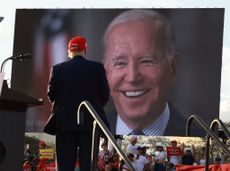Kavanaugh's tribalist defenders
The conservative defense of Kavanaugh is right-wing tribalism, pure and simple


It's taken more than three years, but the members of the conservative movement who stood most strongly against President Trump's hostile takeover of the Republican Party have finally, at long last, come around. It only took a Supreme Court fight and the prospect that the nomination of one of their own to a lifetime appointment would go down in flames.
This reunification of the right over Brett Kavanaugh is tribalism, pure and simple. But of course, since we're talking about anti-Trump Republican holdouts, they're portraying their decision as some great and noble cause, a brave stand on behalf of "every American who has found himself falsely accused, or railroaded by malicious hearsay, or facing an unfeeling bureaucracy that treats juvenile missteps as unforgivable sins."
That would be germane if we were talking about a criminal proceeding. But we're not. We're talking about elevating Brett Kavanaugh to one of the nine most powerful positions in one of three coequal branches of the federal government, a position from which he would preside for decades to come. That makes the confirmation battle over Kavanaugh the most significant political dispute since, well, Trump wrested control of the party away from the very people who are belatedly embracing him as the "one big bully" that conservative moralists want and need on their side.
Subscribe to The Week
Escape your echo chamber. Get the facts behind the news, plus analysis from multiple perspectives.

Sign up for The Week's Free Newsletters
From our morning news briefing to a weekly Good News Newsletter, get the best of The Week delivered directly to your inbox.
From our morning news briefing to a weekly Good News Newsletter, get the best of The Week delivered directly to your inbox.
This is precisely the calculation that white evangelical Protestants made in the months leading up to the 2016 general election. Skepticism about the trash-talking, morally obscene real-estate mogul from Manhattan gave way to enthusiasm, as the religious right rapidly warmed to the idea of Trump repaying their votes with a promise to serve as a strongman protector of conservative Christians living in fear of the atheistic totalitarianism supposedly favored by the Democratic Party of Barack Obama and Hillary Clinton.
Such worries didn't move the less overtly pious but exceedingly high-minded elites of the conservative movement who favored Marco Rubio, Jeb Bush, or Ted Cruz. For them, Trump was a bridge way too far. He was too ignorant, too vulgar, and too unreliable on the movement's eternally fixed list of policy priorities to be the party's standard-bearer.
Until now, that is.
Trump promised during the campaign to nominate to the high court jurists from a pre-approved list of staunchly conservative options, every one of whom would please every faction in the party, including those who found Trump himself unacceptable. That led to muted smiles when Neil Gorsuch's name was put forward and he sailed through to confirmation.
But Kavanaugh is different. This is a man who served loyally in the administration of the last Republican president (George W. Bush), who many inside-the-beltway conservatives know personally and respect, and whose jurisprudence promises to advance longstanding conservative-movement priorities, including the enhancement of executive power and the placing of strict limits on women's reproductive rights. This means that they're strongly disposed to give him the benefit of every doubt, like dozens of character witnesses with media megaphones at the ready to defend their friend and ideological compatriot.
Which is precisely what they've been doing, despite Christine Blasey Ford's compelling and credible testimony against him, despite Kavanaugh's multitude of verifiable lies before the Senate Judiciary Committee, and despite his appalling, self-pitying, viciously partisan temper tantrum in defense of himself.
There isn't a single Kavanaugh defender who doesn't begin from the assumption that he has been falsely accused and Ford is either lying about events of 36 years ago or mistaking him for someone else. How do his defenders know this? They don't. They simply trust him more than they do her. But why? It was always highly unlikely that anyone would corroborate this or any low-profile event from so long ago — especially when that event obviously had far less meaning for everyone involved than it did for the accuser herself. Do I remember every time I got together at age 17 with a handful of friends and drank some beers? Of course not. But I certainly would remember if I'd been sexually assaulted at one of those gatherings.
This certainly doesn't mean that Ford's word alone after so much time would meet the minimum requirement for prosecution of a crime, let alone conviction under the far more stringent criminal standards of guilt beyond a reasonable doubt. It doesn't even mean that her word alone would or should be enough to sink his nomination to the Supreme Court. But we aren't dealing with her word alone. We're also dealing with Kavanaugh's outrageously dishonest description of his own and his friends' behavior in those years. When a man blatantly lies about himself, his word becomes worthless.
Imagine if, instead of dissembling about his teenage partying and drunken escapades with his friends, he responded to Ford's accusation like this:
I have no memory of the events that Ford describes. I don't want to believe I was capable of doing anything like that. But the truth is that I drank too much when I was young and did some stupid things. Could I have done something as stupid and, frankly, flat-out wrong as what Ford alleges? I honestly can't say what I might have done when I was drunk three-and-a-half decades ago. But what I can say is that I soon recognized how irresponsible it was to party so much. By the time I became an adult, began my career in the law, and started a family, I had turned a corner. Please judge me by those actions and not by what I may or may not have done when I was a young, immature, and foolish kid.
That is almost certainly closer to the truth than what Kavanaugh offered up in his bilious appearance before the judiciary committee last Thursday, which was straight up BS and bile.
That's exactly what his fellow conservatives have been swallowing by the bucketful ever since.
I expect as much from Trump and his allies in the GOP. A say-absolutely-anything-to-win political brutalism is simply the way they do business. By contrast, the erstwhile Trump critics who've found themselves gravitating to the president over the past week yearn for elevation — their own and their country's. They long to win while also doing what's right.
But in this case that won't be possible. Rallying to Kavanaugh's side is an act of rank tribalism, and falling into line behind Trump for the sake of that cause only makes it worse.
Create an account with the same email registered to your subscription to unlock access.
Sign up for Today's Best Articles in your inbox
A free daily email with the biggest news stories of the day – and the best features from TheWeek.com
Damon Linker is a senior correspondent at TheWeek.com. He is also a former contributing editor at The New Republic and the author of The Theocons and The Religious Test.
-
 Cicada-geddon: the fungus that controls insects like 'zombies'
Cicada-geddon: the fungus that controls insects like 'zombies'Under The Radar Expert says bugs will develop 'hypersexualisation' despite their genitals falling off
By Chas Newkey-Burden, The Week UK Published
-
 'Voters know Biden and Trump all too well'
'Voters know Biden and Trump all too well'Instant Opinion Opinion, comment and editorials of the day
By Harold Maass, The Week US Published
-
 Is the Gaza war tearing US university campuses apart?
Is the Gaza war tearing US university campuses apart?Today's Big Question Protests at Columbia University, other institutions, pit free speech against student safety
By Joel Mathis, The Week US Published
-
 Arizona court reinstates 1864 abortion ban
Arizona court reinstates 1864 abortion banSpeed Read The law makes all abortions illegal in the state except to save the mother's life
By Rafi Schwartz, The Week US Published
-
 Trump, billions richer, is selling Bibles
Trump, billions richer, is selling BiblesSpeed Read The former president is hawking a $60 "God Bless the USA Bible"
By Peter Weber, The Week US Published
-
 The debate about Biden's age and mental fitness
The debate about Biden's age and mental fitnessIn Depth Some critics argue Biden is too old to run again. Does the argument have merit?
By Grayson Quay Published
-
 How would a second Trump presidency affect Britain?
How would a second Trump presidency affect Britain?Today's Big Question Re-election of Republican frontrunner could threaten UK security, warns former head of secret service
By Harriet Marsden, The Week UK Published
-
 'Rwanda plan is less a deterrent and more a bluff'
'Rwanda plan is less a deterrent and more a bluff'Instant Opinion Opinion, comment and editorials of the day
By The Week UK Published
-
 Henry Kissinger dies aged 100: a complicated legacy?
Henry Kissinger dies aged 100: a complicated legacy?Talking Point Top US diplomat and Nobel Peace Prize winner remembered as both foreign policy genius and war criminal
By Harriet Marsden, The Week UK Last updated
-
 Trump’s rhetoric: a shift to 'straight-up Nazi talk'
Trump’s rhetoric: a shift to 'straight-up Nazi talk'Why everyone's talking about Would-be president's sinister language is backed by an incendiary policy agenda, say commentators
By The Week UK Published
-
 More covfefe: is the world ready for a second Donald Trump presidency?
More covfefe: is the world ready for a second Donald Trump presidency?Today's Big Question Republican's re-election would be a 'nightmare' scenario for Europe, Ukraine and the West
By Sorcha Bradley, The Week UK Published